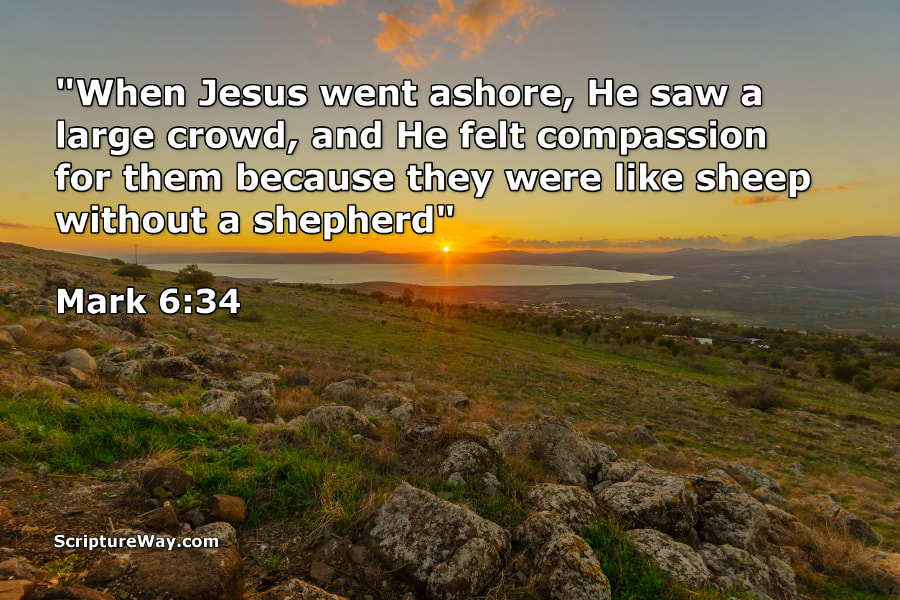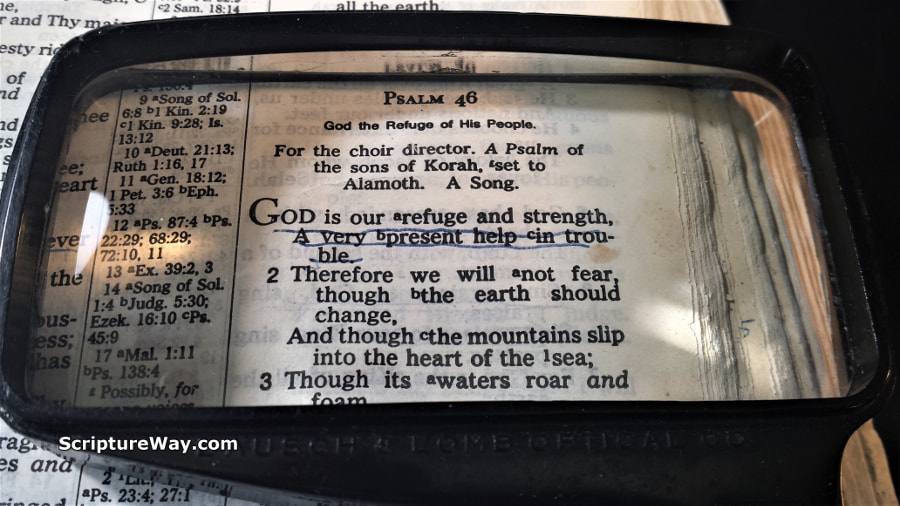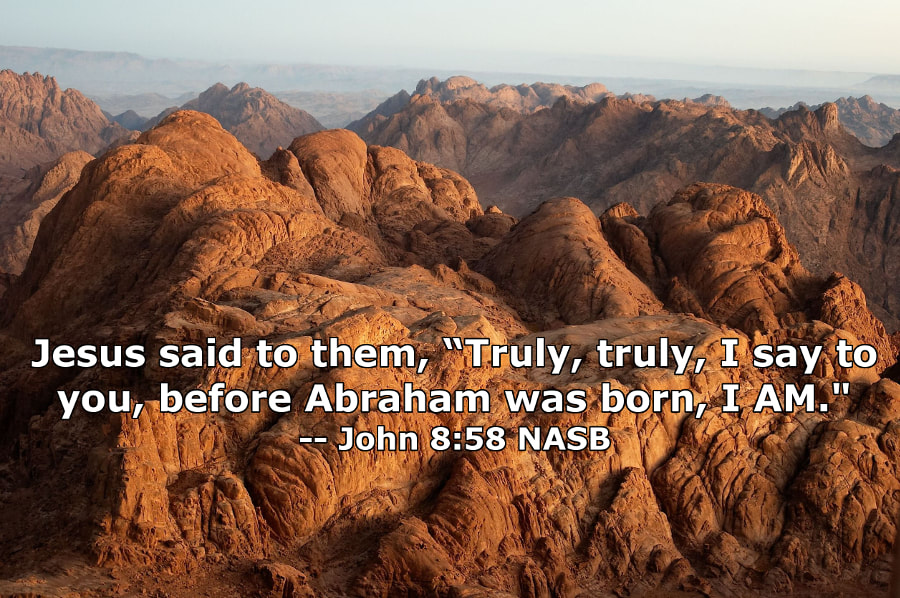This lesson explains how God, our majestic Lord, willingly comes beside us and invites us to cast our burdens upon him.
Consider. What burdens, or load, are you carrying today? God is willing to share your burdens. Will you cast your burdens upon God today?
God as Our Majestic Lord
The same God who is willing to carry our burdens is also our majestic Lord. In the first half of Psalm 68 (Psalm 68:1-18), we see David's emphasis describing the majesty and power of God. The name, Lord, is the English translation of the Hebrew word, Adonay (ad-o-noy'), and is a proper name for God (Psalm 68:17-19, Ref. 1). See in your mind the image of God leading his people in the wilderness, with cloud by day and fire by night (Psalm 68:7, Exodus 13:21). See in your mind thousands upon thousands of angels and chariots attending God in holiness at Sinai (Psalm 68:17, Deuteronomy 33:2). See in your mind the day the Bible describes in Psalm 68:18 and Ephesians 4:8 when Christ ascended on high leading a host of captives.
God as Our Burden Bearer
Notice the abrupt change in verse 19 to the wonderful thought, "Blessed be the Lord, who daily bears our burden" (Psalm 68:19). God, the Lord (Adonay), is blessed (adored with bended knees) and daily (day by day, continually) bears our burden (carries our load) (Ref. 1, Ref. 2, Ref. 3, Ref. 4). The same God who majestically led his people through the wilderness comes beside us today and willingly carries our baggage. "What a thought that is - a God that carries men's loads!" (Alexander MacLaren, Ref. 5, Ref. 6).
The ultimate fulfillment of "Blessed be the Lord, who daily bears our burden" (Psalm 68:19), occurs in God's Son, Jesus Christ. Isaiah prophesied, "Surely he has borne our griefs and carried our sorrows" (Isaiah 53:4). The Apostle Peter writes, "He himself bore our sins in his body on the cross" (1 Peter 2:24). Jesus invites us, "Come to me, all you who are weary and burdened (weighted down), and I will give you rest" (Matthew 11:28, italics added, Ref. 7, Ref. 8). For those who trust in him, Jesus Christ is our Lord and our burden-bearing Savior. What We Should Do with Our Burdens - Cast and Release them onto the Lord
God lovingly invites us to cast our burdens onto him. God wants us to cast our burdens on him because he cares. Psalm 55:22 says, "Cast your burden upon the Lord and He will sustain you; He will never allow the righteous to be shaken." 1 Peter 5:7 says, "Cast all your anxiety on him because he cares for you."
In both the Old Testament and the New Testament cast means to throw or fling (Ref. 9, Ref. 10). The two disciples who brought the colt to Jesus cast (threw) their outer garments (cloaks, robes) onto the young animal in their reverence and love for their Lord before Jesus rode into Jerusalem (Luke 19:35, Ref. 10, Ref. 11, Ref. 12). Unlike fishing where we cast our weighted line into the sea and then pull it back to cast it again, casting our burdens on the Lord should be a one-way trip -- "cast and release," not "cast and retrieve." Let God help you. Cast (throw) your burdens onto the Lord, and release them to him. Trust him to carry your load (Psalm 68:19). He will care for you (1 Peter 5:7). He will sustain you (Psalm 55:22). He will give you rest (Matthew 11:28).
Apply. Whatever your burdens are, take them to the Lord in prayer. Cast all of your burdens upon him, and trust him to carry your load.
Related Lessons
"Cast All Your Anxiety on Him" - 1 Peter 5:7 "Jesus' Invitation - Come to Me and Rest" (Matthew 11:28-30)
References
1. https://biblehub.com/hebrew/136.htm 2. https://biblehub.com/hebrew/1288.htm 3. https://biblehub.com/commentaries/hastings/psalms/68-19.htm 4. https://biblehub.com/hebrew/6006.htm. 5. https://biblehub.com/commentaries/maclaren/psalms/68.htm 6. https://en.wikipedia.org/wiki/Alexander_Maclaren 7. https://biblehub.com/greek/5412.htm 8. http://www.scriptureway.com/home/jesus-invitation-come-to-me-and-rest 9. https://biblehub.com/hebrew/7993.htm 10. https://biblehub.com/greek/1977.htm 11. https://biblehub.com/greek/2440.htm 12. https://biblehub.com/commentaries/vws/luke/19.htm
1 Comment
"Blessed be the God and Father of our Lord Jesus Christ, the Father of mercies and God of all comfort, who comforts us in all our affliction so that we will be able to comfort those who are in any affliction with the comfort with which we ourselves are comforted by God." (2 Corinthians 1:3-4)
Consider. Who is someone you can comfort with the comfort God has comforted you?
Father of Mercies and God of All Comfort
The Apostle Paul joyfully begins the main body of 2nd Corinthians with, "Blessed be the God and Father of our Lord Jesus Christ, the Father of mercies and God of all comfort" (2 Corinthians 1:3). Let's discuss this verse in three parts.
Blessed be the God and Father of our Lord Jesus Christ
Paul begins with the language of a heart which is full of joy and that bursts forth with gratitude (Ref. 1). Paul has a comfort which he recognizes comes from God (Ref. 2). Paul shows us that it is possible and proper to bless God when we, God's people, are experiencing affliction (2 Corinthians 1:3).
The Father of Mercies
Our heavenly Father is the originator, the source of mercy and compassion (Ref. 3). As our heavenly Father, it is God's nature to impart mercy and compassion to his children. The Greek word for mercies in 2 Corinthians 1:3 is oiktirmos (oyk-tir-mos'). The short definition is pity, compassion, favor, grace, and mercy (Ref. 4).
And the God of All Comfort
God is the source of all true consolation and comfort. God is the God of all comfort because it comes from him. There is no other real source of comfort but God; and "he is able abundantly and willingly to impart consolation to his people" (Ref.1).
The Greek word for comfort in 2 Corinthians 1:3 is paraklésis (par-ak'-lay-sis), which means coming along side, encouragement, consolation, and comfort (Ref. 5). "Comfort" is a great theme of 2 Corinthians. In the New American Standard Bible, the English words "comfort," "comforts," and "comforted" occur 10 times in 2 Corinthians 1:3-7 alone. God Comforts Us So We Can Comfort OthersWho Comforts Us in All Our Affliction
As the God of all comfort, God comes along side and encourages us -- all believers in Christ -- in our affliction (2 Corinthians 1:4, John 14:16-17). The Greek word for affliction is thlipsis (thlip'-sis), which means tribulation, especially internal pressure that causes someone to feel confined (restricted, "without options") (Ref. 6). Paul and his co-writer, Timothy (2 Corinthians 1:1), openly tell us from their personal life experience that they had felt an ever-continuing comfort flowing from God.
So that We Will be Able to Comfort Those Who Are In Any Affliction
Paul and Timothy knew that God comforted them not just for their own benefit, but that God's comfort might flow forth through them to others (Ref. 2). In 2 Corinthians 1:4 Paul teaches us that as disciples and followers of Jesus, the affliction we experience is part of our "schooling" and training to sympathize with and comfort others (Ref. 7). Our own life's experience with affliction coupled with God's power flowing through us helps us not only to sympathize with others but also to speak a word in season to those who are weary (Isaiah 50:4). This is the very essence of the work of comforting others (Ref. 2).
With the Comfort with which We Ourselves Are Comforted by God
The best comfort that we as Christian believers can provide to others comes from God, not from the world. As believers in Jesus Christ, we can communicate uniquely to others the forgiveness, the acceptance, and the hope for eternal life that we have through faith in Christ (Ref. 1, Ephesians 2:8-9). Recall Jesus' final words of encouragement to his disciples. "These things I have spoken to you so that in Me you may have peace. In the world you have tribulation, but take courage; I have overcome the world" (John 16:33).
Apply. Thank God for how he has comforted (come along side, encouraged) you in the afflictions you have experienced. Ask God to bring to your mind someone you can comfort (come along side, encourage) in their affliction. Follow through with them as God leads, for example, listening to them, sharing how God has comforted you, and praying for or with them.
References
1. https://biblehub.com/commentaries/barnes/2_corinthians/1.htm 2. https://biblehub.com/commentaries/ellicott/2_corinthians/1.htm 3. https://biblehub.com/greek/3962.htm 4. https://biblehub.com/greek/3628.htm 5. https://biblehub.com/greek/3874.htm 6. https://biblehub.com/greek/2347.htm 7. https://biblehub.com/commentaries/pulpit/2_corinthians/1.htm
"When Jesus went ashore, He saw a large crowd, and He felt compassion for them because they were like sheep without a shepherd; and He began to teach them many things." (Mark 6:34, underline added)
This lesson explains Jesus' attribute of compassion towards people – multitudes and individuals. Jesus not only sympathizes with people, but also acts to alleviate their distress.
Consider. As Jesus' followers, we, too, should show compassion to people, including those outside the faith community.
Definition of Compassion
Before we dive into the scriptures, let's take a look at the meaning of the word, compassion.
The Merriam-Webster online dictionary defines compassion as "sympathetic consciousness of others' distress together with a desire to alleviate it" (Ref. 1). Note the combination of sympathetic awareness of other's distress coupled with action to do something to help them. In the New Testament, the words, feel compassion, literally mean "to have the bowels yearn" (Strong's Exhaustive Concordance, Ref. 2). In the New Testament time of Jesus' ministry, people thought that our "nobler entrails" (such as the heart, lungs, liver, and kidneys) were the seat of our affections (Ref. 2). Jesus Feels Compassion for the Multitudes
The scriptures tell us that when Jesus saw the multitudes of people coming to him he felt compassion for them. Why? Jesus was moved with compassion for them because he saw them "as sheep without a shepherd." Mark 6:34 tells us, "When Jesus went ashore, He saw a large crowd, and He felt compassion for them because they were like sheep without a shepherd; and He began to teach them many things." Matthew 9:36 is similar, and tells us, "Seeing the people, He felt compassion for them, because they were distressed and dispirited like sheep without a shepherd."
Jesus felt compassion for the crowds coming to him because they were a flock that had no protection, no "pasture," no spiritual teaching or guidance, and were in a distressing, painful condition (Ref. 3). They were uncared-for souls, outside of the synagogues of their time. They were weary and hopeless without the Guide and Shepherd who alone can lead them in the way (Ref. 4). Likewise today, Jesus feels compassion for people who are outside of the faith community, who do not know him as their Good Shepherd, and who are suffering through spiritual misery (John 10:1, 9, 11; Ref. 5). People need to know the compassion of Jesus Christ for them, to have their needs met, and to come to Jesus as their Good Shepherd. That's where we as Jesus' followers can help them. Jesus Shows Us Specific Ways to Act with Compassion Towards Groups of People
The gospel writers give us examples of how Jesus acted when he was moved with compassion for the multitudes. We, as Jesus' followers, can and should do the same.
He welcomed them - "But the crowds were aware of this and followed Him; and welcoming them, He began speaking to them about the kingdom of God and curing those who had need of healing" (Luke 9:11). He fed them - "And Jesus called His disciples to Him, and said, 'I feel compassion for the people, because they have remained with Me now three days and have nothing to eat; and I do not want to send them away hungry, for they might faint on the way'" (Matthew 15:32). "And He took the seven loaves and the fish; and giving thanks, He broke them and started giving them to the disciples, and the disciples gave them to the people. (37) And they all ate and were satisfied, and they picked up what was left over of the broken pieces, seven large baskets full" (Matthew 15:36-37). He healed the sick - "When He went ashore, He saw a large crowd, and felt compassion for them and healed their sick" (Matthew 14:14). He taught them many things - "When Jesus went ashore, He saw a large crowd, and He felt compassion for them because they were like sheep without a shepherd; and He began to teach them many things" (Mark 6:34). Jesus Feels Compassion for Individuals
The following accounts describe the compassion Jesus felt for specific people, and the action he took to heal or comfort them.
Jesus touches and cleanses a man from leprosy - "And a leper came to Jesus, beseeching Him and falling on his knees before Him, and saying, 'If You are willing, You can make me clean.' (41) Moved with compassion, Jesus stretched out His hand and touched him, and said to him, 'I am willing; be cleansed.' (42) Immediately the leprosy left him and he was cleansed" (Mark 1:40-42).
Jesus touches and provides sight to blind men - "And two blind men sitting by the road, hearing that Jesus was passing by, cried out, 'Lord, have mercy on us, Son of David!' (31) The crowd sternly told them to be quiet, but they cried out all the more, 'Lord, Son of David, have mercy on us!' (32) And Jesus stopped and called them, and said, 'What do you want Me to do for you?' (33) They said to Him, 'Lord, we want our eyes to be opened.' (34) Moved with compassion, Jesus touched their eyes; and immediately they regained their sight and followed Him" (Matthew 20:30-34).
Jesus comforts a grieving mother - "Soon afterwards He went to a city called Nain; and His disciples were going along with Him, accompanied by a large crowd. (12) Now as He approached the gate of the city, a dead man was being carried out, the only son of his mother, and she was a widow; and a sizeable crowd from the city was with her. (13) When the Lord saw her, He felt compassion for her, and said to her, 'Do not weep.' (14) And He came up and touched the coffin; and the bearers came to a halt. And He said, 'Young man, I say to you, arise!' (15) The dead man sat up and began to speak. And Jesus gave him back to his mother" (Luke 7:11-15).
Summary - Main Principles in this Lesson1. Compassion not only includes feeling sympathy for people, but also a desire to take action to alleviate their distress. 2. Jesus modeled compassion for us - in his interaction with crowds of distressed people and with individuals in need. Often, the people Jesus helped were outside of the "faith community" of Jesus' day. 3. Jesus showed his compassion for people by his actions. Specifically:
Apply. As a follower of Jesus, what are ways that you will show the compassion of Jesus to others through your actions?
Consider. Do you need God's help and strength for what you are facing today? How can you better experience God's protection as your refuge?
God is Our Refuge
The Bible tells us that God is our place of safety and protection from danger and distress. A refuge is a place where we go, and while we are inside, we are protected because our refuge surrounds us as our defense. David writes, "For You have been a refuge for me, A tower of strength against the enemy" (Psalm 61:3). Solomon writes, "The name of the Lord is a strong tower; The righteous runs into it and is safe" (Proverbs 18:10). David tells us from his own experience, "The angel of the Lord encamps around those who fear him, and delivers them" (Psalm 34:7, italics added).
The Bible provides several clear images for God as our refuge - a tower that we run into (Psalm 61:3, Proverbs 18:10), our shelter from the storm (Isaiah 25:4), our rock and fortress (Psalm 18:2), our shield (Psalm 28:7), and our hiding place (Psalm 32:7).
God is Our Strength
Note that Psalm 46:1 does not just say "God is strong" (which he is). This scripture verse says that God is our strength. We who are God's people can receive, experience, and apply God's strength to face our enemies such as worry, fear, discouragement, and opposition. God gives us the strength to accomplish the work he gives us to do in the face of these enemies.
The Apostle Paul knew that God was his strength. Paul wrote during his imprisonment, "I can do all things through Christ who strengthens me" (Philippians 4:13). God provides strength to the believer to accomplish what God gives the believer faith to do (1 John 5:4). As believers, we need God's strength when we encounter resistance and trials. God provides us that strength. Hymn composer Will L. Thompson (1847-1909) writes, "Jesus is all the world to me, My life, my joy, my all; He is my strength from day to day, Without him I would fall" (Ref. 1). David writes, "The Lord is my strength and my shield; in him my heart trusts, and I am helped; my heart exults, and with my song I give thanks to him" (Psalm 28:7). God is a Very Present (Proven) Help in Trouble
The word for help means aid, assistance (Ref. 2, Ref. 3). The word translated as present means proven to be (Ref. 4), that is, God is proven to be our help in trouble. The word very means exceedingly, emphasizing that this statement is true (Ref. 5, Ref. 6). Because God is proven to be our help in trouble, we have nothing to fear (Psalm 46:2).
David writes, "For you have been my help, and in the shadow of your wings I will sing for joy" (Psalm 63:7). The writer of Hebrews states, "The Lord is my helper; I will not fear; what can man do to me?" (Hebrews 13:6).
Summary. Let's review the main principles in this lesson.
1. God is our "go to" place for refuge, safety, and protection from danger. God surrounds us as our defense. 2. God is our source of strength to face our enemies and to do the work he gives us to do. 3. God is proven to be our help in trouble, and we have nothing to fear, repeat, we have nothing to fear.
Apply. Take time now to pray. Thank God for being your refuge - your protection, your place of safety. Ask God to give you strength and faith to face your enemies and to do the work that God has given you to do. Thank God that because of him you have nothing to fear.
Listen to/Watch Video. "A Mighty Fortress" sung by HeartSong - Cedarville University, Cedarville, Ohio, USA.
References
1. https://hymnary.org/text/jesus_is_all_the_world_to_me_my_life_my 2. https://biblehub.com/hebrew/5833.htm 3. https://www.merriam-webster.com/dictionary/help 4. https://biblehub.com/hebrew/4672.htm 5. https://biblehub.com/commentaries/barnes/psalms/46.htm 6. https://biblehub.com/hebrew/3966.htm
Copyright: georgemuresan / 123RF Stock Photo
"He is the image of the invisible God, the firstborn of all creation" (Colossians 1:15). "Jesus said to them, “Truly, truly, I say to you, before Abraham was born, I am” (John 8:58).
This lesson teaches that Jesus is the only begotten Son of God, fully God and fully human, the visible image of the invisible God, and the same God who spoke to Moses saying, "I AM WHO I AM."
Consider. On the evening before his death, Jesus spoke with his disciples. Jesus told his disciples that he was about to leave them (John 13:33).
Who was this Jesus that was speaking to his disciples? Was he just a great teacher or a prophet? Or, was he God as he claimed?
Let's explore several scriptures that tell us who Jesus is. Jesus is the only begotten Son of God
When the time came for the second person of the Trinity (Ref. 1) to become flesh, God sent the angel Gabriel to a virgin named Mary (Luke 1:26-27). Gabriel informed Mary, "Behold, you will conceive in your womb and bear a son, and you shall call his name Jesus" (Luke 1:31).
Mary replied, "How will this be, since I am a virgin?” (Luke 1:34) Literally, Mary asked Gabriel, "How can this be since I do not know (sexual intimacy) a man?" (Ref. 2) Gabriel answered Mary, "The Holy Spirit will come upon you, and the power of the Most High will overshadow you; therefore the child to be born will be called holy—the Son of God" (Luke 1:35). John describes Jesus as the only begotten Son of God in John 3:16. "For God so loved the world, that He gave His only begotten Son, that whoever believes in Him shall not perish, but have eternal life." The Greek word for "only begotten" is monogenés, which means "one (monos) of a class, genos (the only of its kind)." Therefore, Jesus is unique (Ref. 3). The above scriptures establish Jesus' title as the begotten, unique, and only Son of God. Jesus was fully God and fully man
John begins his gospel by describing the Deity of Jesus Christ. "In the beginning [before all time] was the Word (Christ), and the Word was with God, and the Word was God Himself" (John 1:1).
John also describes the Word made flesh. "And the Word became flesh, and dwelt among us, and we saw His glory, glory as of the only begotten from the Father, full of grace and truth" (John 1:14). The Apostle Paul states, "For in Him all the fullness of Deity dwells in bodily form" (Colossians 2:9). These scriptures tell us that Jesus is fully God and fully man. Jesus is the visible image of the invisible God
Throughout Scripture, Jesus, the second person of the Trinity, is the visible image of the invisible God. "He is the image of the invisible God, the firstborn of all creation" (Colossians 1:15). Jesus said, "He who has seen Me has seen the Father" (John 14:9).
The New Living Translation of Hebrews 1:3 explains that Jesus expresses the character of God. "The Son radiates God’s own glory and expresses the very character of God." The Greek word is "charaktér," which means an exact impression (likeness) which also reflects inner character. The preincarnate Son of God was "exceedingly active in the Old Testament" (Ref. 4). Consider these examples where Christ appeared in visible form:
Jesus is the same God who spoke with Moses
In Exodus 3:13, Moses asked God to tell him God's name. God replied to Moses, "I AM WHO I AM"; and He said, "Thus you shall say to the sons of Israel, 'I AM has sent me to you' " (Exodus 3:14).
Jesus confirmed that he is the same God who said to Moses, "I AM WHO IAM." Jesus said to the Jews who opposed him, "Truly, truly, I say to you, before Abraham was born, I AM" (John 8:58). We began this post with a question. Who was this Jesus that was speaking to his disciples on the evening before his crucifixion? (John 13:33) Jesus who said to his disciples, "I am the way, and the truth, and the life; no one comes to the Father but through Me" (John 14:6) is the same God who spoke to Moses and said, "I AM WHO I AM" (Exodus 3:14).
Apply. If someone asked you to explain who Jesus is, how would you answer?
|
Daily Bible Verse(Click the link above) AuthorMr. Whitney V. Myers. Christian. For more information, please visit the Author Page. Posting ScheduleI plan to provide new postings about once a month. Planned Topics(subject to change) Recent Posts(most recent three months) Popular Posts(top 10) Categories
All
Archives
July 2024
|
|
Copyright 2018-2024 Whitney V. Myers |
Listed in Feedspot's Top 100 Bible Study Blogs and Websites |





 RSS Feed
RSS Feed
